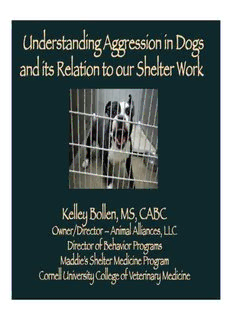
Understanding Aggression in Dogs and its Relation to our PDF
Preview Understanding Aggression in Dogs and its Relation to our
! Understanding Aggression in Dogs and its Relation to our Shelter Work" Kelley Bollen, MS, CABC" Owner/Director – Animal Alliances, LLC" Director of Behavior Programs " Maddie’s Shelter Medicine Program" Cornell University College of Veterinary Medicine" Aggression is a complex behavior" Definition: acts or threats designed to cause injury" !Displays of aggression in dogs include lunging, snapping, and " "biting."" !Threat behaviors include freezing, staring, snarling, and " "growling. " Why are dogs sometimes aggressive?" Aggression is Adaptive" ! • The goal of adaptive behavior is to survive" ! • In order to survive, an animal must adapt "and control events that impact their "very desire to survive" ! • Animals are genetically prepared to use "behavior that will ensure their survival "and control their environment." ! • Aggression is one behavioral response "towards that goal. " "" " " " " " " "" ! • “Basic patterns of aggression seem to be " "unalterable aspects of the basic genetic "code of canines” (Coren, 2004)" ! • Like all animals, dogs react to fear with the "Flight or Fight response " ! • Aggression serves a communicative function "for dogs when dealing with conflict – "whether it be offensive or defensive in "nature." Genetics and selective breeding" ! • Some breeds of dogs are bred specifically to be more aggressive." ! • In addition to its genetic component, the degree of aggressiveness exhibited by an individual is also shaped by:" "- Early experience (socialization, or lack there of) " "- Learning (dogs learn that aggression “works”). " The major influences to any behavior" Genetics" Environment" Learning" Two basic categories of aggression" ! • Respondent Aggressive behavior" ! • Operant Aggressive behavior" Respondent Aggression – reflex-like aggression evoked or elicited by aversive stimulation (pain-elicited aggression)." "( respondent aggression is one reason that the use of aversive positive punishment (shock) can be problematic)"
Description: